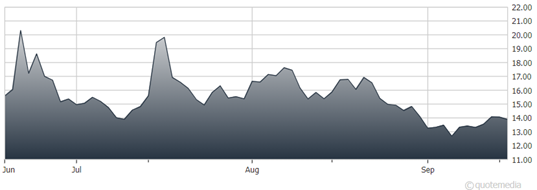Grail Inc. (GRAL) is the developer of Multi-Cancer Early Detection test kits, and it recently published results focused on a subset of prostate cancer in their studies. The market reacted quite negatively to the release, but that presents a potential entry opportunity, writes Ashley Adams, CEO and biotechnology analyst at Lickety-Split Analytics.
Investors focused on statistics from the earlier stage detection:
“Detectability for stage I and II cancers were 4.2% across both studies combined, which is expected with low shedding prostate cancer tumor fraction and is consistent with cfDNA literature in prostate cancer. Test sensitivity of prostate cancer for all stages was 11.2% in substudy CCGA-3. Notably, the MCED test detected no low-grade cancers, 1.9% of intermediate-grade cancers, and only 4.2% of stage I and II cancers across both studies combined. Of the detected cases, 93% were Gleason grade groups 3-5.”
Grail Inc. (GRAL)
Investors overreacted to statistics like low stage 1 and stage 2 detection, which is to be expected in slow-growing cancers like prostate cancer. Tests like Grail’s detect cancers through a Methylation-based process, meaning the cancer is detected when a methyl group (CH3) is added to specific DNA sequences and alters genetic expression or protein function.
It is hard to detect methyl in slow-growing cancers because there are low levels of methylation changes and there can be significant variations in methylation patters. Lower stage prostate cancers may not be as high of a priority to detect because treatment may not be needed right away, as low-grade cancer cells may look more like normal cells.
Investors may have overlooked the high significance of detecting intermediate- to high-grade prostate cancer among 50+ other cancer types all within the same blood test.
“Results from this analysis showed that of the prostate cancers that were detected by the MCED test, most were clinically significant (93% were intermediate or high grade and 67% were stage III or IV). For detected prostate cancers, the cancer signal of origin (CSO) prediction accuracy was > 90%.”










